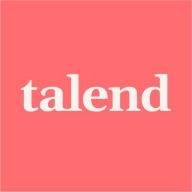

Informatica PowerCenter and Talend Data Fabric compete in the data integration and management category. While Informatica PowerCenter boasts robust features and reliability, Talend Data Fabric is favored for its flexibility and open-source options.
Features: Informatica PowerCenter stands out with comprehensive ETL tools, scalability for large data volumes, and strong data transformation capabilities. Additional features include detailed data governance and powerful debugging tools. Talend Data Fabric offers versatile data integration, a user-friendly interface, and cost-effective solutions. It excels in real-time data processing and offers open-source adaptability.
Room for Improvement: Informatica PowerCenter could enhance its ease of deployment and reduce the complexity of its learning curve for new users. It may also benefit from more flexible pricing models. Talend Data Fabric might improve its documentation and customer support resources. Additionally, it could enhance integration with certain enterprise systems and optimize resource consumption for complex deployments.
Ease of Deployment and Customer Service: Informatica PowerCenter offers a traditional deployment process that can be resource-intensive. While customer service is reliable, it may require a learning curve for complex setups. Talend Data Fabric allows for more flexible deployment, often requiring less initial setup time. It supports a strong community-driven approach to customer service.
Pricing and ROI: Informatica PowerCenter requires a higher initial setup cost but represents a solid investment for large enterprises needing robust and scalable solutions. Talend Data Fabric presents lower upfront costs due to its open-source nature, making it an attractive option for businesses seeking budget-friendly solutions without compromising functionality.
| Product | Market Share (%) |
|---|---|
| Informatica PowerCenter | 6.0% |
| Talend Data Fabric | 0.9% |
| Other | 93.1% |


| Company Size | Count |
|---|---|
| Small Business | 15 |
| Midsize Enterprise | 10 |
| Large Enterprise | 72 |
| Company Size | Count |
|---|---|
| Small Business | 4 |
| Large Enterprise | 3 |
Informatica PowerCenter is a data integration and data visualization tool. The solution works as an enterprise data integration platform that helps organizations access, transform, and integrate data from various systems. The product is designed to support companies in the full cycle of a project, from its initial rollout to critical deployments. Informatica PowerCenter allows developers and analysts to collaborate while accelerating the work process to deploy projects within days instead of months.
The Advanced edition of the product provides an additional real-time engine which allows companies to have always-on enterprise data integration. This ensures seamless collaboration and increment of data lineage visibility and impacts analysis.
The Premium edition of the solution offers an early warning system that detects unexpected behaviors or incorrect utilization of resources in the workflows and alerts companies in the case that these occur. This version of the product also offers automatic data validation, which ensures data accuracy and reduces testing time and expenditure of resources for by up to 90%.
Informatica PowerCenter Features
The product provides users with various features which allow them to execute data integration initiatives such as analytics, data warehousing, data governance, consolidation, and application migration. The features of the solution include:
Informatica PowerCenter Benefits
The benefits of using Informatica PowerCenter include:
Reviews from Real Users
Yahya T., a developer and architect at L'Oreal, says the product is stable, provides good support, and integrating it with other systems is very fast.
Mohamed E., a senior manager for Data management and data governance at a tech company, says PowerCenter is stable, mature, and offers flexibility in building the pipeline and has a drag-and-drop mode because it's GUI-based; technical support is brilliant.
Talend, a leader in cloud data integration and data integrity, enables companies to transform by delivering trusted data at the speed of business.
Talend Data Fabric offers a single suite of apps that shorten the time to trusted data. Users can collect data across systems; govern it to ensure proper use, transform it into new formats and improve quality, and share it with internal and external stakeholders.
Over 3,000 global enterprise customers have chosen Talend to help them turn all their raw data into trusted data to make business decisions with confidence — including GE, HP Inc., and Domino’s.
We monitor all Data Integration reviews to prevent fraudulent reviews and keep review quality high. We do not post reviews by company employees or direct competitors. We validate each review for authenticity via cross-reference with LinkedIn, and personal follow-up with the reviewer when necessary.